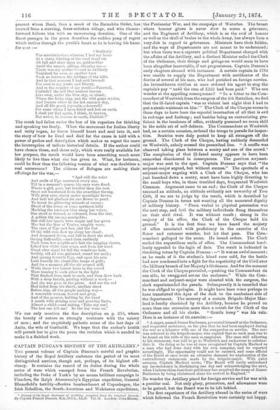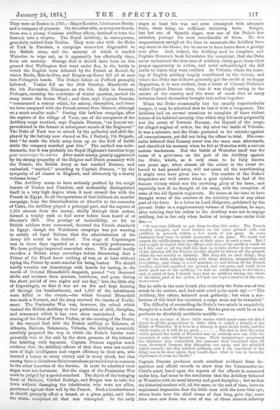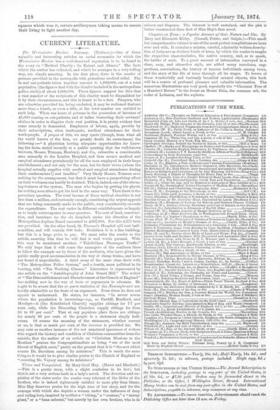CAPTAIN DUNCAN'S HISTORY OF THE ARTILLERY.* THE present volume of
Captain Duncan's careful and graphic history of the Royal Artillery embraces the period of its most distinguished services, though not, perhaps, of its highest effi- ciency. It contains the record of its duties during the whole series of wars which emerged from the French Revolution, including the Duke of York's by no means brilliant campaign in Flanders, Sir Ralph Abercromby's Egyptian expedition, General Blomefield's terribly-effective bombardment of Copenhagen, the Irish Rebellion, the South-American and Walcheren expeditions,
• History of the Royal Regiment of Artillery, compiled from the Original Records.
By Captain Francis Duncan, MA.,D.O.L., LL.D. Vol IL Loudon: JohnMurray. the Peninsular War, and the campaign of Waterloo. The breast where honour glows is never slow to nurse a grievance, and the Regiment of Artillery, which is as the soul of honour
as well as the skull of brains to the whole Army, has always been a very Job in regard to grievances. Ministers have their foibles, and the ways of Departments are not meant to be understood ; but when there was a separate political Department charged with the affairs of the Artillery, and a distinct Minister called the Clerk of the Ordnance, their doings and goings-on would seem to have
been altogether inscrutable, if not preposterous. Captain Duncan's early chapters abound with instances. A certain captain in 1781 was unable to supply the Department with certifieatea of the deaths of several of his men, who had perished on foreign service.
An inconsiderate civilian at once ordered his agent to stop the captain's pay " until the sum of £223 had been paid." Who can wonder at the appalling consequence? "In a letter to the Com- mandant of Woolwich from the surgeon of the 4th Battalion, we find that the ill-fated captain ' was so violent last night that I had to put a strait-waistcoat on him." The Clerk of the Cheque seems in those days to have been the especial incarnation of all that is evil in red-tape and foolscap ; and besides being an excruciating pro- ficient in the insolence of office, evidently possessed no mean skill in the noble art of self-defence. The Commandant at Woolwich had, on a certain occasion, ordered the troops to parade for inspec- tion. Sentries were duly posted to keep all strangers off the ground. The Clerk of the Cheque, having suddenly descended on Woolwich, calmly crossed the proscribed line. " A scuffle was observed taking place between a sentry and one of the crowd."
The complexion of that ill-fated sentry appears to have been somewhat discoloured in consequence. The garrison serjeant- major was sent to the spot. Captain Duncan says that "the serjeant-major argued, but without success." The spectacle of a serjeant-major arguing with a Clerk of the Cheque, who has just knocked down a sentry, must have been highly diverting to
the small boys who, in those troubled days, frequented Woolwich Common. Argument came to an end ; the Clerk of the Cheque assumed an attitude, an attitude evidently not unworthy of Tom Crib, if we are to judge by the result, which is described by Captain Duncan in terms not wanting all the measured dignity of military history. " From verbal to physical persuasion was the next step, and Loth the military individuals flung themselves on their civil rival. It was without result ; strong in the majesty of his office, the Clerk of the Cheque held his ground." It is the first time we have heard the majesty of office associated with proficiency in the exercise of the flexor and extensor muscles, but let that pass. The Com- mandant galloped to the scene. He issued orders. The Clerk smiled the supercilious smile of office. The Commandant heed- lessly appealed to the logic of fists. The result is indicated in throbbing terms by Captain Duncan :—" It was an awful moment ; as he reads of it the student's blood runs cold, for the battle had now condensed into a fight for the superiority of the Civil over the Military branch of her Majesty's Ordnance. And for the moment the Clerk of the Cheque prevailed,—pushing the Commandant 6n one side, he swaggered across the enclosure." While the Com- mandant and serjeant-major` were closeted with the surgeon, the clerk superintended the parade. Subsequently it is recorded that he was obliged to apologise. It might have been wiser perhaps to have transferred this Ajax of the desk to the combatant side of
the department. The memory of a certain Brigade-Major Mac- leod is fondly cherished by the Artillery, because he proved on more than one occcasion more than a match for the Clerk of the Ordnance and all his clerks. " Gentle irony " was his vein. Here is an instance of its .exercise :- " A negro, named James Buchanan, presented himself at the Ordnance, and requested assistance, on the plea that he had been employed during the war as a labourer with one of the companies on service. The case was referred to the brigade-major, who replied that no such man was to be found on the rolls of the men so employed. The man still adhering to his statement, was told to go to Woolwich and endeavour to substan- tiate it. On doing so ho was at once recognised by Captain Macleod as a man who had done duty with his own company, and he reported accordingly. The opportunity could not be resisted, and some official of the Board at once wrote an offensive demand for explanation of the contradictory statements made by the brigade-major. With quiet sarcasm, Captain Macleod wrote, 'The Board will easily understand my inconsistency in disclaiming one day and acknowledging the next, when I inform them that their petitioner has acquired the name of James Buchanan by being christened since his arrival in England.'" No wonder the Artillery pined for foreign service and for war with a peculiar zeal. Not only glory, promotion, and allowances were to be gained, but the Board was to be left behind.
The first experience of the Artillery abroad in the series of wars which followed the French Revolution were certainly not happy.
They were at Toulon in 1793,—Major Koehler, Lieutenant Brady, and a company of gunners. On the other side, as everyone knows, there was a young Corsican artillery officer, destined to turn the linstoek into a sceptre. The Royal Artillery, in consequence, gracefully retired from Toulon. They were also with the Duke of York in Flanders, a campaign somewhat disgraceful to the British arms, and the memory of which it needed Waterloo to wipe out, as it apparently has effectually done, from our memory. Strange that it should have been on this ground that Wellington first went under fire, in the battle in which the English were defeated by the French at Boxtel, by which Breda, Bois-le-Duc, and Bergen-opLZoom fell all at once into Pichegru's hands. The Duke's defeat at Pale& promptly followed. Venloo fell on the 28th October, Maestricht on the 5th November, Nimeguen on the 8th. Early in January, Pichegru, scorning the courtesies of winter quarters, carried his army across the frozen Waal ; and then, says Captain Duncan, " commenced a retreat which, for misery, discomfort, and losses we have compared with the French retreat from Moscow, although on a much smaller scale." During this luckless campaign, after the capture of the village of Vans, one of the companies of the Artillery corps received, says Captain Duncan, "an honour un- precedented in the former or subsequent annals of the Regiment." The Duke of York was so struck by the gallantry and skill dis- played by the battery now classed as No. 4 Battery, 7th Brigade, that " he made the whole army form up on the field' of battle while the company marched past him." The method was melo- dramatic, but it was probably his Royal Highness's harmless hope pour encourager les autres. After much misery, greatly aggravated by the strong sympathy of the Belgian and Dutch peasantry with the French, the British Army at last reached Bremen, and embarked, " soothed," according to Captain Duncan, " by the sympathy of all classes in England, and ultimately by a hearty welcome home."
The Artillery seems to have seriously profited by the rough lessons of Toulon and Flanders, and undeniably distinguished itself in a very high degree when it next crossed fire with the French in Egypt. In all the operations of that brilliant six months' campaign, from the disembarkation at Aboukir to the surrender of 'Cairo, the Artillery played a principal part, and the capture of 1,251 cannon from the enemy, chiefly through their action, formed a trophy such as had never before been heard of at Shooter's Hill. The prestige of invincibility, so far as British soldiers were concerned, deserted the French standards in Egypt, though the Walcheren campaign was yet wanting to satisfy all loyal Britons that the administration of the Army left much to be desired. The siege of Copenhagen was in those days regarded as a very masterly performance. We have perhaps improved somewhat since. We should hardly sacrifice a British army nowadays before discovering that a Prince of the Blood knew nothing of war, or at least without trying the Prince by court-martial for being beaten. We shduld bardly wreathe our Armstrongs with laurels for having, in the words of General Blomefield's despatch, poured "six thousand shells and carcases from mortars, howitzers, and guns, during the short period of two nights and one day," into the little city of Copenhagen, so that it was set on fire and kept burning all through the bombardment, and 1,500 of the inhabitants were killed in the streets,—for which General Blomefield was made a Baronet, and the army received the thanks of Parlia- ment. The Peninsular War was, however, the school which trained the British Artillery to that perfection of skill, discipline, and armament which it has ever since maintained. In the arming of the lines of Torres Vedras, at the crossing of the Douro, in the unequal duel with the French artillery at Talavera, at Albueta, Barrosa, Salamanca, Vittoria, the Artillery invariably carefully prepared the way in which the Duke's battles were generally won at the end, by the stern pressure of the infantry line bristling with bayonets. Captain Duncan supplies much evidence that the Artillery officers of that time were not merely men of high intelligence and expert efficiency in their arm, who learned a lesson in every victory and in every check, but that among them a chivalrous disinterestedness prevailed not so common in the other branches of the Service. It must be admitted their sieges were not fortunate. But the -sieges of the Peninsular War must be judged by a special standard. The object of the besieging force at Badajoz, Ciudad Rodrigo, and Burgos was to take the town without damaging the inhabitants, who were our allies, garrisoned against their will by the French. Such a bombardment as should promptly effect a breach at a given point, and then the storm, comprised all that was attempted. In the early
sieges at least this was not even attempted with adequate force, there being no sufficient battering train. Burgos, last but one of Spanish sieges, was one of the Duke's few mistakes, perhaps the most considerable of them. He was magnanimous enough at the time to exonerate the Artillery from any share in the blame, but he seems to have borne them a grudge ever after. And, indeed, the Artillery used to complain, and Captain Duncan's book formulates the complaint, that the Duke never understood the true uses of artillery, rarely gave them their propei opportunity in action, and never acknowledged the full credit to which they were entitled. At Vittoria, where the mass- ing of English artillery largely contributed to the victory, and where the Duke has hitherto generally got the credit of its happy disposition, it is now evident, from a letter of Colonel Dickson's which Captain Duncan cites, that it was simply owing to the nature of the country and the want of roads that so many batteries found themselves brought into action together.
When the Duke occasionally lost his usually imperturbable temper, it may be admitted that he lost it with a vengeance. The Artillery had on several occasions to complain of those violent lesions of his habitual serenity. One which they felt most poignantly was the arrest of Norman Ramsay, the Bayard of the corps, for alleged neglect of orders, the day after the battle of Vittoria. It was a mistake, and the Duke persisted in his mistake against all remonstrances, yet did not bring the officer to _trial. His com- rades believed that Ramsay never was the same man afterwards, and cherished his memory when he fell at Waterloo with a certain morose tenderness. But the battle of Waterloo itself was the cause of a grievance on the part of the Artillery against the Duke, which, as it only came to be fully known two years ago, when almost all the actors in the event re- ferred to had passed away, will not cause all the heartburning it might once have given rise to. The readers of the Duke's despatches are well award what a poor opinion be had of the famous victory which was the crowning glory of his fame, and especially how ill he thought of his army, with the exception of some of the old Spanish regiments. He seems at the time to have thought worse of the conduct of the Artillery than of any other part of his force. In a letter to Lord Mulgrave, published by the present Duke in a supplementary volume of Despatches, he says, after relating that his orders to the Artillery were not to engage artillery, but to fire only when bodies of troops came under their fire :—
"It was very difficult to got them to obey this order. The French cavalry charged, and were formed on the same ground with our artillery in general, within a few yards of our guns. In some instances they were in actual possession of our guns. We could not expect the artillerymen to remain at their guns in such a case. But I had a right to expect that the officers and mon of the artillery would do as I did, and as all the staff did, that is, to take shelter in the squares of the infantry till the French cavalry should be driven off the ground, either by our cavalry or infantry. But they did no such thing ; they ran off the field entirely, taking with them limbers, ammunition, and everything : and when, in a few minutes, we had driven 'off the French cavalry, and had regained our ground and our guns, and could have made good use of our artillery, we had no artillerymen to fire them; and, in point of fact, I should have had no artillery during the whole of the latter part of the action, if I had not kept a reserve in the com- mencement."
But he adds in the next breath (for evidently the Duke was of two minds in the matter, and had each mind quite made up) :—" The Artillery, like others, behaved most gallantly ; but when a mis-
fortune of this kind has occurred, a corps must not be rewarded." The difficulty of reconciling the Duke's two minds is exquisitely brought to a head in this sentence. But he goes on until he at last produces an absolutely antithetic muddle :—
"It is on account of these little stories which mast come out that I object to all the propositions to write what is called a history of the Battle of Waterloo. If it is to be a history, it must be the truth, and the whole truth, or it will do no good The fact is, that the army which gained the battle of Waterloo was an entirely new one, with the exception of some old Spanish troops. Their inexperience occasioned the mistakes they committed, the rumours they circulated that all were destroyed because they themselves ran away, and the mischief which ensued ; but they behaved gallantly, and I am convinced if the thing was to be done again, they would show what it was to have the experience of even one battle."
Captain Duncan produces much excellent evidence from de- spatches and official records to show that the Commander-in- Chief's mind, based upon the reports of the officers in command under him, bad come to the conclusion that the Artillery behaved at Waterloo with its usual bravery and good discipline ; but we fear the historical student will, all the same, to the end of time, have an unpleasant impression that the little man with the keen blue eye, whose brain bore the chief stress of that long, grim day, more than once saw from the core of one of those staunch infantry squares which won it, certain artillerymen taking means to ensure their living to fight another day.




































 Previous page
Previous page